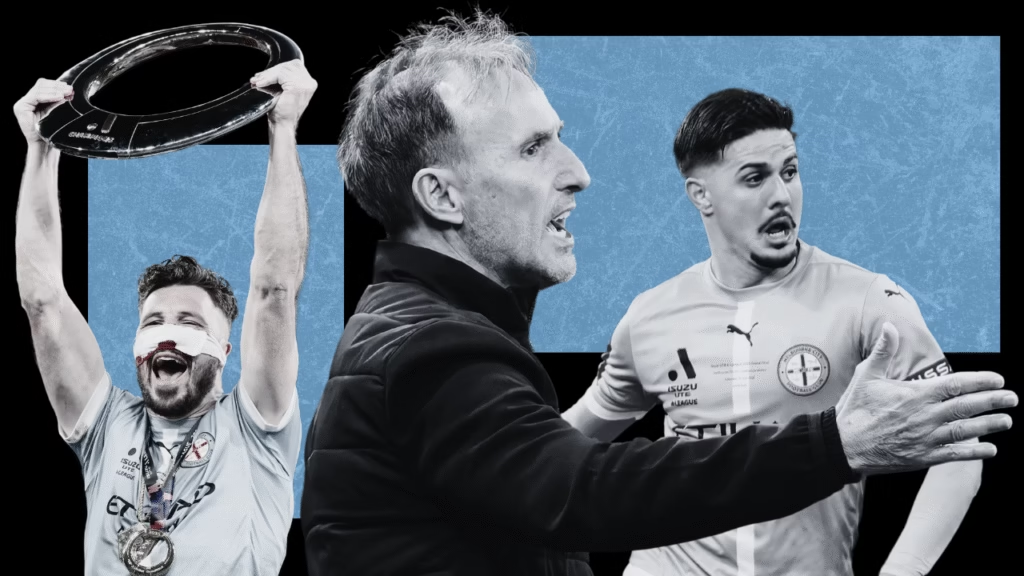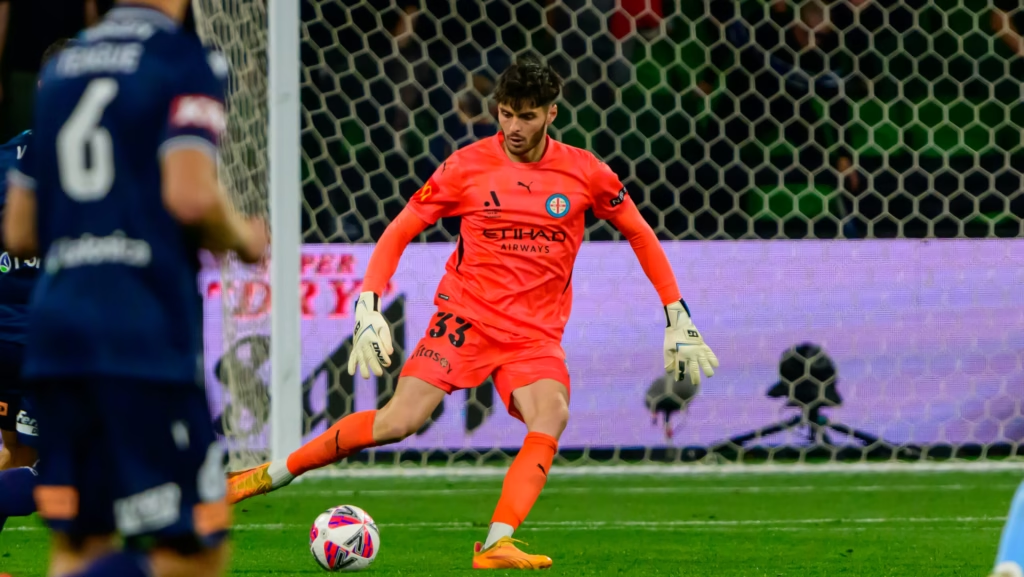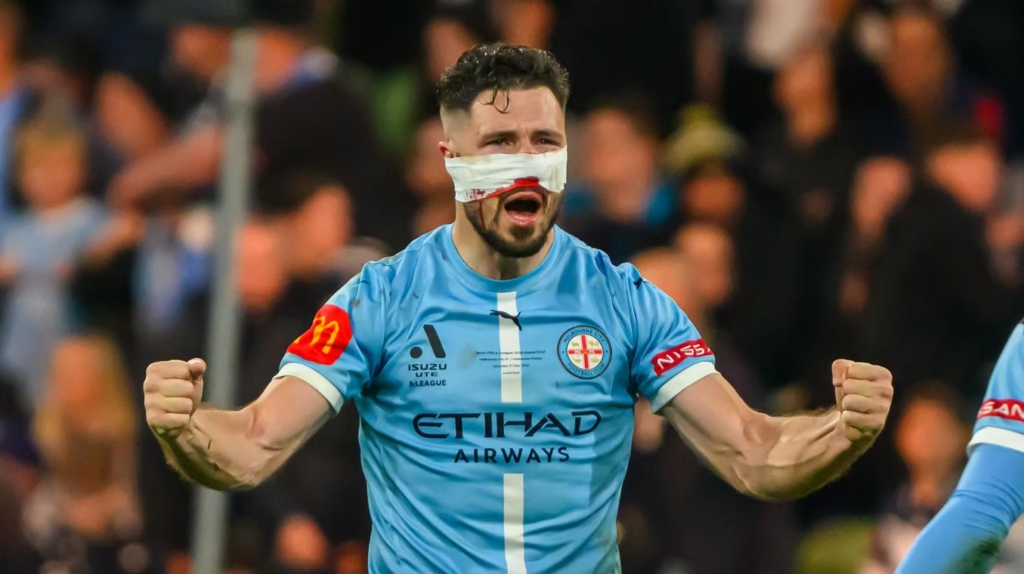
Melbourne City 2024/25 A-League Men's season review. Photos: Marcus Robertson / Round Ball Australia.
Melbourne City are Champions of Australia once again. It’s been a fascinating season for Aurelio Vidmar’s side, one plagued with conversations about their injury list that according to club captain Aziz Behich allowed them to go “under the radar”, in the first of Round Ball Australia’s season review series.
The talk of those off the field was warranted. City entered the season with the shortest available list of any team in the league, which only grew with the early season injuries to Andrew Nabbout and Marco Tilio. But finding a way to cope with this crisis would define the early to middle portion of their season.
After a few weeks of recalibration when their stars (bar Nabbout) eventually returned, City turned into a defensively resilient behemoth that apart from an against the run of play loss to Newcastle (City ended the match over two expected goals above the Jets), didn’t lose a game in their last 14 of the campaign.
Vidmar deserves tremendous praise for how he was able to turn around this team from their lowest ladder position since the City Football Group took over control of the club, to A-League Champions with just one off-season in charge.

Season Grade: A+
Sure, they didn’t win the Premiers Plate. But that’s essentially the only blemish on this season with still enough wiggle room to slot in to the top letter grade.
And was doing that ever realistic given the injury stretch they did have? As Vidmar continued to emphasise throughout the season, within the scope of “controlling the control-ables” that they could, City likely extracted the best possible season from this A-League campaign.
Given the age profile, experience and momentum of that Auckland FC team, the way the season played out proved that no one was able to match their consistency over the entire league. In fact, considering City only earned one point from the Black Knights in the home-and-away season, they should probably be thanking their derby rivals for taking care of Auckland in the semis.
The prospect of a Grand Final in Auckland would have almost certainly been a more difficult assignment. But that wasn’t a variable that was in their control. So go forwards and beat who is in front of you, and no one did that better than Melbourne City in the final months of the season.
Trust the pipeline
Many clubs around the league have had to forcibly introduce youngsters into the first team due to the poor financial state of the league. City are not immune to this – long over are the days of their marquee strategy when CFG initially acquired the club, including the likes of Tim Cahill and David Villa. Despite their owners’ deep pockets, those in charge of this tentacle are given a budget as well.
So whilst City did come from a higher starting position compared to most clubs in terms of their one for one quality, when the injuries started to come they were also forced to rely on youth. As Lawrence Wong put it, the young players entering into the first team were able to do so rather seamlessly because of the consistencies in the City academy training curriculum.
Wong, alongside Kavian Rahmani, Medin Memeti, Benjamin Mazzeo, and Zane Schreiber all made 10 or more appearances as teenagers this season, and all impressed.
This isn’t even to mention the likes of 19-year-old Max Caputo who was already a first team regular when fit, and the magnificent breakout season from 21-year-old goalkeeper Patrick Beach.

Beach struggled at moments early on in the season, the flashpoint of which when he got caught with the ball at his feet by Melbourne Victory’s Ryan Teague as one of the three first half goals conceded in the first half of that disappointing Derby.
But Vidmar continued to back Beach’s improvement. “Yes, he made a mistake. Yes, it cost us a goal. But he will learn from that, and I expect him to get back into the well,” he said after that first Melbourne Derby of the season.
“Nothing’s going to change from our perspective of the way we want to do things, and he’ll have to just get better.” Got better he did. He’s contributed to the best defence in the league, earned a train-on position with the Socceroos in March and is today an A-League Champion.
The Wounded Warrior
Mathew Leckie’s impact on this year’s campaign was simultaneously minimal and seismic. Leckie only started six games all season, but as his coach put it after the final match of the season, they let the “Ferrari out of the garage” for an all-time Grand Final performance.
The blood soaked bandages around his nose won’t be forgotten from the long list of bizarre A-League moments anytime soon, least of all that the blood continued to seep through as he collected his Joe Marston medal as player of the Grand Final.

This legacy was only heightened when Leckie revealed post-game that he played the entire match with a hamstring strain, Vidmar adding on that he persistently refused a substitution in the latter moments of the game. Hero.
There were many other individuals that made their mark. Tilio enjoyed arguably a league-leading run of form in the final months after he shook off a hamstring injury. Nathaniel Atkinson was immense at right back, and was also asked to play some varying roles in midfield during the early portion of the season. Kai Trewin went from strength to strength after his transfer from Brisbane Roar, taking out the club’s top honour on awards night.
Next? Asia.
Despite only losing one game across both of their Men’s Champions League campaigns, City have never managed to qualify for the knockout rounds of Asia’s top Men’s club competition.
A few draws, groups where often just one of four progress and the inexplicable concession of a late equaliser against Zhejiang (China) in the final match of the group stage in 2023 are to blame for this, but with the new Champions League Elite format, things will be different.
The League phase structure is forgiving. As little as seven points qualified Pakhtakor in eighth spot in the West side of the inaugural edition this campaign. Three wins from eight games should almost certainly see you through to the knock-outs. From their, it’s one two-legged tie also against East opposition to qualify for the centralised final eight.
Reaching that last eight and getting the opportunity to take on the best of West Asia in the Saudi Arabian finals is a realistic goal that Vidmar and his troops should be striving for as they’ll look to significantly improve upon the Central Coast Mariners – this year’s Australian participants – who only managed a single point.
Balancing Asia with the league is difficult, of course. But it is possible – the Mariners have shown both sides of that spectrum over the past two season, going back to their historic continental treble in 2023/24.
Top six is always the expectation for Melbourne City – one they’ve never failed to achieve since the City Football Group took over Melbourne Heart in 2014. Do that whilst making the knockouts of the ACL Elite and you could consider it a successful follow up season from the 2024/25 A-League Champions.
